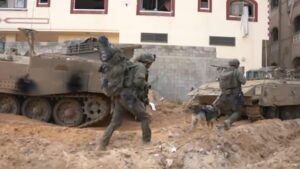Bosnia marks 7th anniversary of verdict against ‘Butcher of Bosnia’ Karadzic
BELGRADE, Serbia (AA) – Bosnia and Herzegovina on Friday marked the seventh anniversary of the verdict against ex-Bosnian Serb leader Radovan Karadzic, who was found guilty of genocide and crimes against humanity committed against Bosniak Muslims during the 1990s war in Bosnia.
Considered to have spearheaded the most severe war crimes committed in Europe since World War II, Karadzic was sentenced to 40 years in prison for his deeds that left hundreds of thousands dead, and several more displaced.
A UN tribunal in The Hague found Karadzic guilty on 10 counts out of a total of 11 charges.
He faced two counts of genocide, but while the court convicted him for his role in the Srebrenica massacre in 1995, he was found not guilty of other genocides in the Bosnian municipalities of Bratunac, Foca, Kljuc, Prijedor, Sanski Most, Vlasenica, and Zvornik.
Adel Sabanovic, 40, one of the witnesses, was only 9 years old when the war started, and he together with his family left his native city of Vlasenica to the UN safe zone in Srebrenica by hiding in the forest.
The Serb forces were trying to wrest territory from Bosnian Muslims and Croats to form a state.
The UN Security Council had declared Srebrenica a “safe area” in the spring of 1993.
However, troops led by Gen. Ratko Mladic, who was later also found guilty of war crimes, crimes against humanity, and genocide, overran the UN zone.
Sabanovic said Mladic in front of cameras said that they would first remove women, children, and the elderly, and then the others from the area, but when the cameras were turned off, the children were forcibly taken from their mothers’ arms and killed, and the massacres continued.
Dutch peacekeeping troops failed to act as Serb forces occupied the area, killing some 2,000 men and boys on July 11 alone.
Around 15,000 Muslim residents of Srebrenica fled to the surrounding mountains, but Serb troops hunted down and killed 6,000 more people.
Later, Sabanovic found himself imprisoned in detention camps and was forced to carry water to wash bloody knives.
“I experienced very bad things in a factory in Potocari in 1995. I was forced to carry water to wash the bloody knives with which they cut the people who were killed before my eyes. They raped women,” said Sabanovic.
He added that although 28 years have passed since the genocide happened, he can’t forget those events.
In 1995, the Dayton Peace Agreement ending the war in Bosnia created a new federal government system with two entities: the Republika Srpska and the Croat and Bosniak-populated Muslim Federation of Bosnia and Herzegovina.
Karadzic’s role
Bosnia had gained independence on March 1, 1992, months after Slovenia and Croatia broke away from the former Yugoslavia.
A referendum on independence for Bosnia and Herzegovina was held, in which 64% of its people participated and voted 99.44% in favor.
A month later, the EU and the US announced their recognition of the state.
However, Karadzic, the then-political leader of Bosnian Serbs, launched an ethnic cleansing campaign in Bosnia and Herzegovina, triggering a war that led to a catastrophe for Bosniak Muslims.
In November 1995, Serbs – under international pressure – stopped the war with the Dayton accord.
Karadzic was the president of the self-styled Bosnian Serb Republic and supreme commander of its armed forces from 1992 to 1995 when around 100,000 Bosnians died as the former Yugoslavia descended into ethnic bloodshed.
Karadzic – who has been dubbed ‘Butcher of Bosnia’ – was first indicted in July 1995 for the shooting of unarmed civilians in Sarajevo and taking UN peacekeepers hostage. Four months later, he was accused of orchestrating the mindless, hate-driven slaughter of 8,000 Muslim men and boys after Serb forces seized the UN’s Srebrenica “safe area” in eastern Bosnia.
He was finally arrested in Belgrade in 2008.










